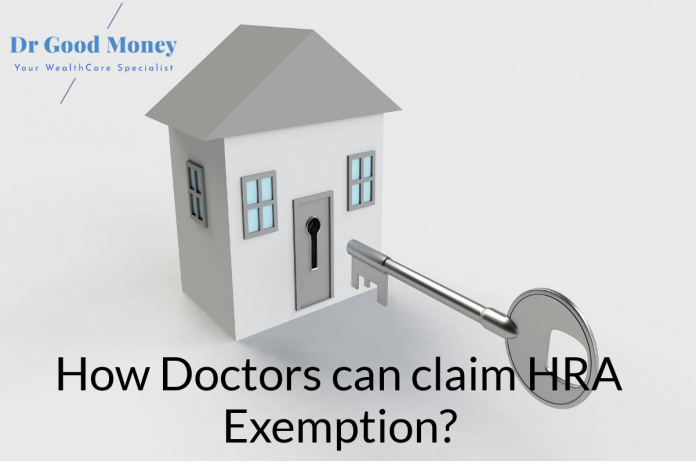HRA is an important component of the salary income of doctors. It is a fixed, pre-determined allowance (generally a percentage of basic salary) that is provided in addition to the basic salary.
As the name suggests “House Rent allowance” is meant to support the house rent which a salaried doctor pays, and thus this is exempted to some extent by Income-tax authorities.
HRA exemption is not available to those doctors who live in their own house, as they are not paying rent to anyone. This article is about HRA exemption, in what scenarios doctors can claim exemption, and How to claim the same.
(Also Read: How Doctors can make the best use of Deductions under section 80C?)
How to calculate HRA Exemption amount?
As explained above, the HRA exemption can only be claimed by any salaried doctor (If receiving it as a Part of salary), working in a public/private hospital, and only if he’s living in the rented accommodation and is paying regular rent. Tax treatment of HRA is as below:
This calculation requires 4 information – the city you live in, the basic salary that you receive, what rent you pay, and what is the actual HRA benefit that you get. HRA exemption amount will be the least of the below 3 options:
- 50% of the basic salary where residential house is situated in a Metro city like Delhi, Mumbai, Kolkata, or Chennai, Else 40% of the basic salary where residential house is situated at some other place.
- Actual Rent Paid minus 10% of basic salary.
- Actual HRA Received
Here Basic salary means Basic+ Dearness allowance.
Let’s Understand the HRA exemption clause with an example:
Saurabh, a consultant doctor in XYZ Hospital lives in rented accommodation in Delhi and Pays monthly rent of Rs 20000/-. His Annual salary package details are as under. What would be the HRA exemption limit in this case?
Basic – Rs 480000
HRA – Rs 240000
Medical Allowance – Rs 15000
Special Allowance – Rs 200000
Solution:
As Dr. Saurabh lives in a metro city, so the HRA exemption limit would be the least of the following:
- 50% of basic = Rs 240000/-
- Actual Rent Paid minus 10% of Basic = (20000*12-48000)=192000/-
- Actual HRA Received = Rs 240000/-
The Least of the above is Rs 1.92 lakh. Out of the total HRA received Rs 1.92 lakh will be deducted and the remaining will be added to the gross taxable income and will be taxed as per the income tax slab he falls in.
(Also Read: Old or New Income Tax Slabs, what a doctor should choose?)
How to claim HRA exemption?
You need to submit the Actual Rent receipts to your hospital administration as proof of rent payment. Hospitals may ask for a Rent agreement also.
On the rent receipts basis, the accounts department of the hospital calculates the HRA exemption benefit and deducts TDS accordingly.
Amendment announced in October’2013
Earlier people claim this exemption by submitting the fake rent receipts too, and thus from FY 2013-14 all salaried taxpayers, including doctors who want to claim HRA exemption will now have to report their landlord’s PAN number if the total Rent in a year exceeds 1 lakh.
Earlier the limit was Rs 1.80 lakh, which now has been reduced to Rs 8333/- per month.
In case the landlord does not have a PAN number, then he has to submit a declaration by the landlord stating the same along with his name and address.
This will serve a dual purpose for IT authorities, as they can keep a check on the landlord if he’s paying taxes on this income or not, and also this will act as a deterrent to the employees in tax evasion.
So whenever you furnish rent receipts to your employer which is more than 1 lakh a year, don’t forget to mention the PAN Number of your landlord.
(Also Check: Income Tax Deductions for FY 2020-21, Infographics)
Please note that if the Monthly Rent payment is Rs 8000 or above, you need to furnish the Pan number of your landlord too, else you won’t be able to claim this HRA exemption.
Other Important points to note to claim HRA exemption:
- If you are living with your parents, you can pay rent to them and claim HRA exemption. But in this case, your parents have to show this rent as their income and pay tax accordingly.
- You cannot pay rent to your spouse and claim exemption.
- Your city of residence will be counted to calculate the HRA exemption limit. For e.g, if you work in a metro city but reside in a Non-metro city then in this case, you will be entitled to a 40% benefit as explained above.
- If you own a house in one city but resides in another city due to employment reasons, you are eligible to claim the HRA exemption. If your own house is on loan, then you can also claim home loan tax benefits along with HRA benefits.
Did you find the details on the HRA exemption useful? Do share your views. For any query, you may ask in the comments section below.
